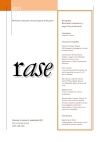Las puntuaciones pisa predicen casi toda la repetición de curso a los 15 años en españa
DOI:
https://doi.org/10.7203/RASE.4.3.8730Keywords:
grade retention, school retard, class-bias, sex-bias Blas Abstract
Abstract
Grade retention, as educational transitions in general, may be seen as determined by factors internal to schools (academic factors, also called primary since Boudon) and by actors external to schools (social or secondary factors). In this study I use the PISA data for Spain in the 2000, 2003 and 2006 PISA waves to test the hypothesis that academic factors are the only determinants of grade retention. The PISA data show strong associations between grade retention and three social or secondary factors: parental schooling, students’ gender and students’ immigrant status. Now, when PISA scores are controlled for through linear or logistic regression, these associations almost completely disappear. More precisely, the advantage of women on men disappears by just taking into account PISA reading scores, and the advantage of natives on immigrants disappears when grade retention is neatly distinguished from just grade retard. However, reduction to the cognitive factors measured by PISA failed for half the disadvantage of late-born students in all three waves and for circa one third of the difference linked to parental schooling in the 2006 wave. These residuals were not reduced by taking into account behavioural variables or the private or public management of schools; neither were they augmented by the slight relaxing of promotion criteria operating in low-level schools. The effect of parental schooling might be linked to formal and informal pressure of high status parents against grade retention. I did not find hypothesis (not even of such ad hoc brand) to explain the difference linked to birth dates
 Downloads
Downloads
Downloads
Published
How to Cite
-
Abstract652
-
PDF (Español)366
Issue
Section
License
![]()
This work is licensed under a Creative Commons Reconocimiento-NoComercial-CompartirIgual 4.0 Internacional.




